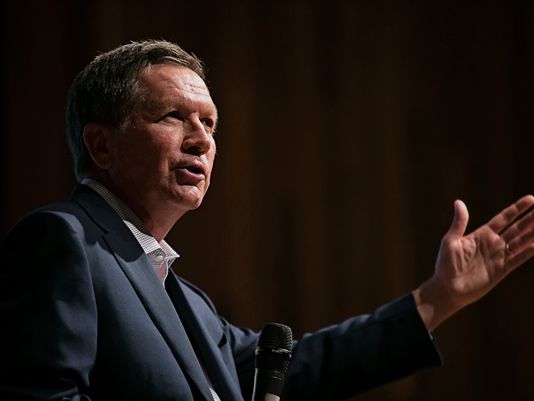
COLUMBUS, Ohio — John Kasich has two problems.
You may have already noticed the first. Kasich is going to run for president, in a campaign scheduled to launch Tuesday.
But do you know who he is?
Here's the second: Kasich is the popular second-term governor of Ohio and an 18-year veteran of Congress. But the same Ohio voters who have never handed him a loss, whose swing-state endorsement is crucial to his White House résumé, question whether he really could be president. To some, it's almost like he'll always be the boy next door.
Much of the country doesn't know him. The people who do, know him too well.
Then there's a third group: believers.
Kasich's experience, candor and moderate views are winning him a growing number of fans in New Hampshire and Iowa and among politicos elsewhere.
He could outshine presumed frontrunner Jeb Bush, they say. His experience level would challenge Marco Rubio. And if Republican voters can coalesce around a moderate like Kasich, he might even pose a threat to Hillary Clinton.
CAMPAIGNING LIKE HE MEANS IT
Maybe the doubters don't realize what a big deal it is to be the governor of Ohio.
Every time Kasich addresses a group of Republicans, he talks about his landslide re-election in 2014. Almost without fail, several people say: "Wow." Once, in Georgia, someone gasped.
One thing is clear: Many Republican primary voters feel a responsibility to raise up a candidate who can win back the White House. And no Republican has ever won the presidency without winning Ohio.
For Kasich, the journey to presidential candidacy is rooted in his re-election. Touting income-tax cuts and economic growth, he rolled over scandal-ruined Democrat Ed FitzGerald, 64% to 33%. Kasich won 86 of Ohio's 88 counties – even the one containing Democratic stronghold Cleveland.
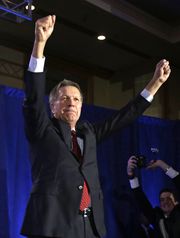
A month after the election, he launched a national tour to promote a federal balanced-budget amendment. Then he began campaigning in early-primary states.
"It was sort of amazing, right?" he said after his first trip to New Hampshire, in March. "You come to something like this and see how people react, and it's pretty positive. It really does have an impact on the way you think."
But to run for president requires more than positive vibes. Recently, Kasich, 63, seemed to flip a switch, from entitled elder statesman to earnest campaigner.
It's a role he hasn't filled since 2010, when he eked out a two-point victory over incumbent Democrat Ted Strickland to become Ohio's governor.
That election marked Kasich's third-straight defeat of a Democratic incumbent. He knocked the first one off in 1978, becoming a state senator at age 26. He kicked off his nine terms in Congress in 1982, becoming the only Republican in the country to defeat an incumbent that year.
Kasich's only failed election? The last time he ran for president, in 1999. Kasich had helped lead a charge in the 1990s to balance the federal budget and sought to convert a growing national profile into a White House bid. (Even now, most conservatives who recognize Kasich on the campaign trail cite his balanced-budget experience in Congress.)
Enthusiasm and financial support for George W. Bush forced Kasich to end his 1999 presidential campaign in July. The loss kicked off a decade outside of public office: working for Lehman Brothers out of a two-person office in Ohio, hosting a show on Fox News, writing books.
Kasich says he didn't prepare for his first presidential bid. This time, he says, "I can see sort of the pathway as to how I can be president. I can see what the trek is like to the top of Mount Everest."
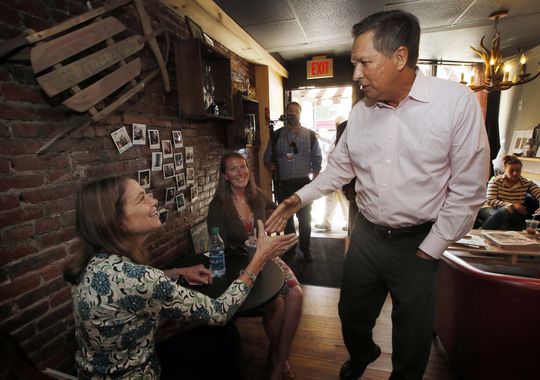
LESSONS LEARNED
Something else has changed for Kasich. He’s intentionally less of a jerk.
Take this exchange, from a campaign stop in Georgia. When a reporter asked about an executive order he'd issued, taking away union rights for some home-health-care workers, he cut off the question, answered brusquely and walked away. He later, out of nowhere, apologized and took time to answer the question. It was a deferential, even courteous, gesture not always seen from Kasich with reporters.
He's almost assumed an "aw shucks" demeanor when he thanks voters on the campaign trail, making jokes about how few people came to see him when he ran in 1999. "Aw shucks" is definitely not natural Kasich.
"Most people don't know me very well. People make judgments," he explained.
"I'm a McKees Rocks boy," he said, referencing his Western Pennsylvania childhood hometown. "We're rough and tumble there. We're direct and blunt and all that kind of stuff."
To be fair, he is still quite sure of his own rightness.
As he said last month, "The doubters are not experts."
Are the believers experts?
"Uh, yeah, pretty much," he said.
And he is still unapologetic. Nearly every campaign stop, he answers a question the way the conservative questioner doesn't like. But most of the time, people seem OK with it. It's refreshing, they say.
"There's a Midwestern bluntness, but without a Northeastern edge," said John Watson, who served as chief of staff for former Georgia governor Sonny Perdue and who has introduced Kasich to Atlanta donors.
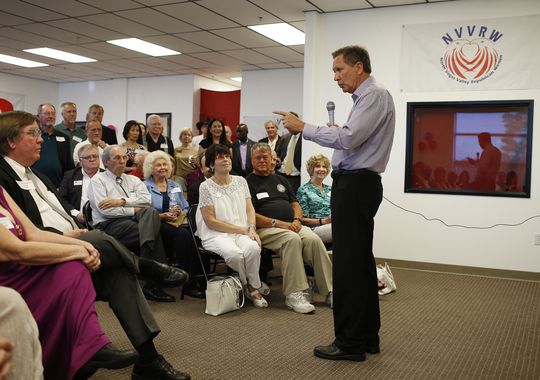
Republican political junkies are often familiar with Kasich's support for Common Core educational standards or for Medicaid expansion under President Obama's health care law.
But how about this?
In Iowa, a woman asked about officials' misbehavior, calling out Lois Lerner, formerly of the IRS, and Clinton.
"I'm more worried about what we're going to do to fix America than I am about Hillary's (email) server," Kasich said, almost chastising the woman.
Yet she told the Columbus Dispatch after the event that she was "fine" with his answer, and Kasich "appears to be presidential."
"You have to look at the totality of the candidate on all the issues and whether they hold to their belief," said Robb Thomson, a Republican activist whose father served as governor of New Hampshire. "Are they trying to pander to me? I don't think Governor Kasich does a lot of pandering."
HOW TO MAKE FRIENDS AND INFLUENCE PEOPLE
Teresa Fedor wasn't prepared for the result of her first meeting with Kasich.
The Democratic state representative walked out during Kasich's first State of the State address, joining a protest in the Statehouse rotunda over his plan to limit the collective bargaining rights of public employees. During hearings for the anti-union bill, state troopers closed the Statehouse to the public, citing overcrowding concerns. Fedor defied them, dramatically opening the doors to crowds outside and then joining a lawsuit over Statehouse access.
The bill passed, but Ohio voters overwhelmingly voted to repeal the legislation a year after electing Kasich governor.
A few months later, Fedor asked to meet with Kasich. His advisers told him to decline. He didn't take their advice.
It turned out Fedor had been trying to pass comprehensive anti-human trafficking legislation.
Early into her pitch, Kasich signed on. "Why don't we pass your bill?" the governor said.
She stared at him. "Do you really mean it?" Fedor said.
Kasich has since signed two massive bills and an executive order, stiffening penalties for traffickers and johns and providing services to victims. Fedor still opposed Kasich's re-election bid in 2014, but newspapers have run photos of the two hugging at bill signings. "No one was more surprised than me" at the partnership, Fedor says.
Kasich credits his faith in God with his interest in stopping human trafficking. It's also one of the motivators for his signature gubernatorial accomplishment: expanding Medicaid under Obamacare, a move which angered conservatives and required heavy Democratic support.
"For me, faith is the do's, not the don'ts," Kasich said in May to a group of about 250 Georgians, who mostly responded in thoughtful silence.
Kasich says his faith has grown consistently since the late 1980s, after his parents died in a car crash with a drunken driver.
"I'm just trying to figure out how my life can have meaning in the world," Kasich told me. "My life is not going to be, 'I'm waiting for a voice' or 'I'm waiting for an email.' I don't know if God really emails or not."
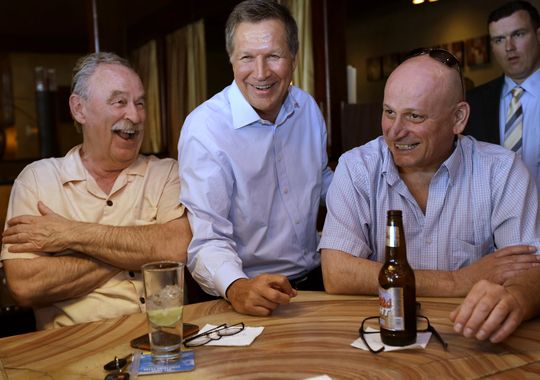
Kasich routinely polls at 1 to 2% nationally in the crowded GOP field– and in Iowa, and in New Hampshire. Aides believe his candor will stand out in a debate. But he's polling so poorly he risks missing the cut for the first one, Aug. 6 in Cleveland.
So Kasich goes back to his roots: what he did while running for state Senate or Congress. Calling supporters. Visiting homes. And that means New Hampshire, whose population of 1.3 million is about double that of a congressional district.
"You don't have to meet the whole country," Kasich told me. "You build your own army. ... I've never met anybody who I didn't think I could get to vote for me if I could talk to them."
For what it's worth, Kasich also has a strategy for taking on Clinton, whom he's leading in Ohio polls.
"I don't believe you beat Hillary by talking about Benghazi or emails or anything like that," said Kasich, who has repeatedly declined to criticize the former first lady and secretary of State. "The person that's going to get elected is someone that can give people confidence that they can renew the American spirit."
Is Kasich – the incumbent-defeating state senator and congressman and governor – out of his league?
Not a bit, said Dick Wright, an elderly Navy veteran from Charleston, S.C. "I think he's electable," he said.
After all, said Wright's stepson, Russell Guerard: "Somebody's got to be president."
- Publish my comments...
- 0 Comments
